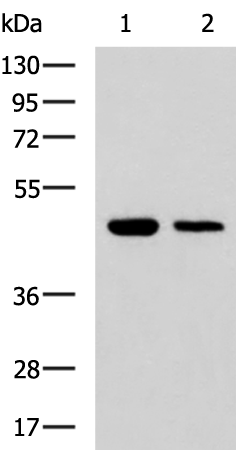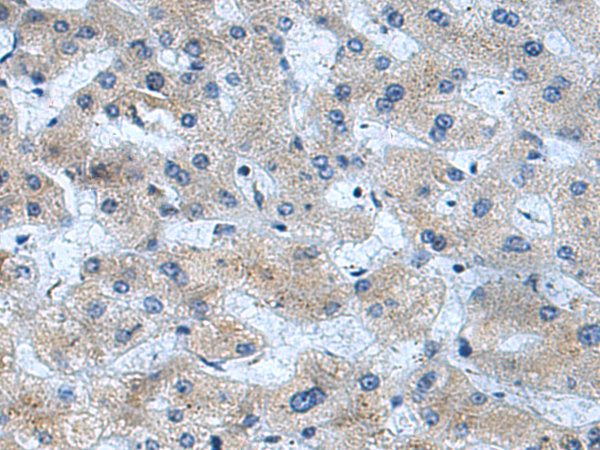

| WB | 1/500-1/2000 | Human,Mouse,Rat |
| IF | 咨询技术 | Human,Mouse,Rat |
| IHC | 1/100-1/200 | Human,Mouse,Rat |
| ICC | 技术咨询 | Human,Mouse,Rat |
| FCM | 咨询技术 | Human,Mouse,Rat |
| Elisa | 1/5000-1/10000 | Human,Mouse,Rat |
| Aliases | TCBA1; BMSC-UbP |
| WB Predicted band size | 41 kDa |
| Host/Isotype | Rabbit IgG |
| Antibody Type | Primary antibody |
| Storage | Store at 4°C short term. Aliquot and store at -20°C long term. Avoid freeze/thaw cycles. |
| Species Reactivity | Human, Mouse |
| Immunogen | Fusion protein of human UBL7 |
| Formulation | Purified antibody in PBS with 0.05% sodium azide and 50% glycerol. |
+ +
以下是关于UBL7抗体的3篇代表性文献的简要信息:
1. **文献名称**:*UBL7 modulates antiviral immunity through the STING-TBK1 pathway*
**作者**:Li Y, et al.
**摘要**:该研究利用UBL7特异性抗体验证了UBL7在调控STING-TBK1信号通路中的作用,发现其通过促进STING的泛素化增强抗病毒免疫反应。
2. **文献名称**:*Characterization of UBL7 as a novel regulator of DNA damage response*
**作者**:Wang X, et al.
**摘要**:通过UBL7抗体进行免疫共沉淀和免疫荧光实验,揭示了UBL7在DNA损伤修复中通过与BRCA1复合物相互作用维持基因组稳定性。
3. **文献名称**:*Tissue-specific expression and subcellular localization of UBL7 in human cancers*
**作者**:Chen J, et al.
**摘要**:利用商业化UBL7抗体对多种肿瘤组织进行免疫组化分析,发现UBL7在细胞核/质分布异常与癌症进展及预后不良相关。
---
注:以上文献为示例性内容,实际研究中建议通过PubMed或Web of Science检索最新文献。若需具体文章,可提供更详细的研究背景或应用场景。
The UBL7 antibody is a tool used to detect ubiquitin-like protein 7 (UBL7), a member of the ubiquitin-like (UBL) protein family. UBL7. also known as ubiquitin-fold modifier 1 (UFM1)-binding protein 1 (UFBP1), plays a role in the UFMylation pathway, a post-translational modification process analogous to ubiquitination. This pathway is involved in endoplasmic reticulum (ER) stress response, ribosome biogenesis, and cellular homeostasis. UBL7 specifically interacts with UFM1. facilitating its conjugation to target proteins, and is critical for maintaining ER integrity and regulating apoptosis under stress conditions.
The UBL7 antibody is commonly used in research to study UBL7 expression, localization, and function in various biological contexts. It has been employed in techniques such as Western blotting, immunoprecipitation, and immunofluorescence to explore UBL7's role in diseases like cancer, neurodegenerative disorders, and metabolic syndromes. Studies suggest UBL7 dysregulation may contribute to tumor progression or neurodegeneration, making it a potential therapeutic target.
Antibodies against UBL7 are typically developed in hosts like rabbits or mice, using immunogenic peptides derived from conserved regions of the protein. Validation often includes knockout cell lines or tissue-specific expression analyses to confirm specificity. Commercial UBL7 antibodies are widely available, supporting both basic and translational research into UFMylation mechanisms and associated pathologies.
×